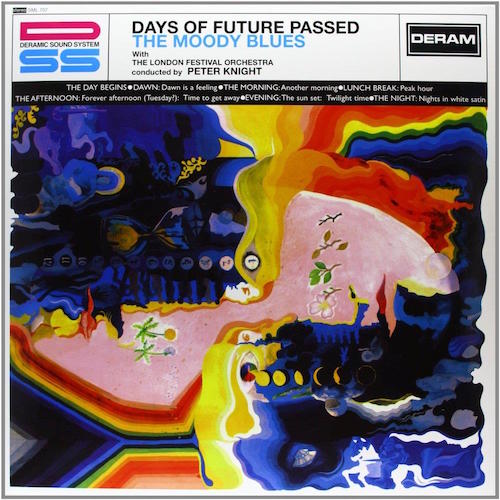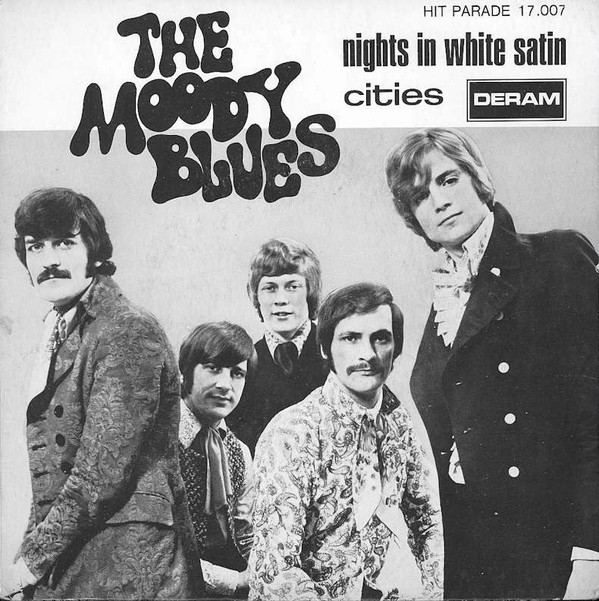Moody Blues Days of Future Passed Original Cover Art
The Moody Dejection' Masterpiece, 'Days of Future Passed'
by

At that place wasn't a corking bargain of precedent, either inside the group or on the popular music has landscape, for Days of Future Passed when The Moody Blues recorded their (sort-of) debut album. The British quintet had only just reinvented itself with a new lineup and a new audio, built in large function around the Mellotron, played by keyboardist and founding fellow member Mike Pinder. That instrument—previously used so finer on an influential handful of Beatles tracks (and intriguingly by Brian Jones on the Rolling Stones' Their Satanic Majesties Request—finally afforded rock bands the ability to incorporate "classical"-type sonic textures in their music in a relatively practical fashion.
The hybrid rock/popular and classical (or at concluding classical-leaning) aesthetic of Days of Futurity Passed hadn't been attempted past many significant artists prior to the Moodys' effort. At roughly the same time that DOFP was being made, Love'southward Forever Changes was being recorded more than than 5,000 miles away. But the bizarre textures of Love's anthology, impressive though they would be, were far less aggressive than what the Moody Blues (along with producer Tony Clarke and conductor/composer Peter Knight) would achieve with Days of Time to come Passed.
Watch the Moody Blues perform "Tuesday Afternoon" in 1967
For the project, the band would supply 10 popular songs and a couple of brief poems; all 5 members had a hand in composing cloth for the anthology. Separately, Knight equanimous and bundled material for the fictitious London Festival Orchestra to play. His pieces provided the sonic linkage between the popular tracks; they would function as the mucilage that held the project together every bit a cohesive whole instead of a mere collection of pinnacle-notch songs.

A French 45 picture sleeve for "Nights in White Satin"
The anthology opens with an exceedingly long fade-in of a struck gong; a full xxx seconds pass before Knight's orchestra kicks in, the aural equivalent of time-lapse photography of a flower in bloom. "The Solar day Begins" provides a kind of overture for the anthology, folding in bits of the songs that are to follow. Knight teases out the signature melodic lines from a few of the popular songs—about notably the start and last of those, "Dawn is a Feeling" and "Nights in White Satin"—earlier leading the orchestra into a section redolent of parts of Tchaikovsky's "Nutcracker Suite." Knight'south lush orchestration is very much in a calorie-free-classical vein, and its attainable pop values gear up the scene for the band's tunes.
Drummer Graeme Edge provides the ring'due south first offering on the disc, the poem "Morning Celebrity" (not credited or listed on the original LP sleeve). Wonderfully recited by Pinder, the spoken-discussion piece is serious and hostage, yet largely gratuitous of pretense. Regardless of how one feels about poetry in general, it's near impossible to imagine Days of Future Passed without the spoken passages. And the strings that back Pinder's recitation add just the right bear on.
Afterwards another brief calorie-free-classical piece ("Dawn"), the Moody Blues make their first appearance on the tape with "Dawn is a Feeling." Justin Hayward'southward romantic, yearning vocals are supported primarily by Pinder on piano and Mellotron; the remainder of the ring contributes in of import yet subtle means. Even though they were recorded separately, the band'southward work and Knight's orchestration come together seamlessly.
Related: Hayward talks well-nigh the group's masterpiece
Knight does an admirable job of creating orchestral melodies that pb into the group'south songs; one such piece introduces Ray Thomas' loping "Another Morning time." The Moodys' tune finally spotlights one of the band's strongest assets: its soaring song harmonies. Thomas' flute serves to erase, in the listener's mind at least, the carve up betwixt band and orchestra.
Another Knight interlude, "Tiffin Break," i of his best efforts on the entire prepare, guides the listener into the midday part of the Moody Blues' musical version of a typical day in the life of an Everyman. Bassist John Lodge's kinetic "Peak Hr" is the hardest-rocking tune on Days of Future Passed, and points the way toward the grouping'due south subsequent albums (all made without Knight and his orchestra). Along with some very expressive Mellotron work from Pinder and more than glorious harmonies, Order'south underrated bass playing is a cardinal nugget of the vocal. Elsewhere, if just for a few seconds, Hayward provides one of the record'southward few guitar solos. With the grandiose notwithstanding appropriate end of "Peak Hour," the album'southward first side concludes.
"Tuesday Afternoon" is 1 of the Moody Blues' best-known and best-loved tunes, and information technology'southward worn quite well over the last half-century. Attributable in part to its indelible popularity, "Tuesday Afternoon" is perhaps the least dated runway on the entire album. Hayward'southward lead song soars while the band provides able, agile support. Once again, it'south Thomas' flute work that leads into Knight's beautiful orchestration.
John Lodge's moody, minor-key "(Evening) Time to Get Abroad" adds a fleck of grit and mystery to the album'south overall grapheme. Hayward'south energetic acoustic guitar strumming and Pinder'southward Mellotron lead into the ethereal vocal harmonies of the song's chorus. Even as apprehensive an musical instrument as Thomas' tambourine is a key ingredient in the sound. And performed twice, the tune'southward falsetto-sung bridge is equally fine a bit of music as the Moodys would e'er produce. Pinder'south Mellotron horns add a bit of extra texture.
And Pinder's "Sunset" is easily the about exotic slice of music on Days of Hereafter Passed. Unusual percussion, Thomas' flute and Knight's (real) strings come together to provide a backdrop for a front-and-eye Pinder lead vocal. Nominally part of the same track, Thomas' insistent "Twilight Time" provides a link to the Moodys' earlier R&B/trounce-group style, only once again Pinder's Mellotron transports the song into the new style.
Related: Thomas (in his final interview) and Pinder think Days of Future Passed
Watch John Order perform "Sunset" during the 2017 Moodys tour celebrating the album's 50th anniversary
The romantic grandeur of "Nights in White Satin" signals the beginning of the finish of Days of Future Passed. Lodge's bass, Border'south drumming and Hayward's acoustic guitar are kept low in the mix, leaving sonic infinite for Hayward's plaintive atomic number 82 vocal. Pinder joins in on Mellotron, initially playing a unmarried-note tune, somewhen adding chord swells on the keyboard. The second verse features a Mellotron counter-tune intertwining with Hayward's vocal. Equally the chorus approaches, the whole group provides stirring vocal harmonies. A descending bass figure followed past a single thump of Edge'due south snare drum leads into a Ray Thomas flute solo. Other instruments are added to the mix during that solo.
For the next poetry of "Night in White Satin," Knight's orchestra joins in, adding tonal color. The climactic chorus finds the orchestra one time again in full blossom, now alongside the group. A royal orchestra restatement of the song'due south signature melodic line dissolves into an system full of anticipation. It is followed past an orchestral tune that evokes mental images of twinkling stars, but the right properties for Pinder's reading of Edge's "Late Complaining." After a final orchestral flourish, and a mighty strike upon of a gong, Days of Future Passed concludes.
Watch the original 1967 video for "Nights in White Satin"
Released on November x, 1967, Days of Hereafter Passed initially sold modestly in the U.Yard., reaching just #27, with "Nights in White Satin" climbing to #xix. In the United States, however, information technology was a different story: The album rocketed all the way to #iii in Billboard, but "Nights in White Satin" stalled at #103, with "Tuesday Afternoon" faring improve at #24. A full five years later though, with the Moody Dejection now an established recording and concert act, "Nights…" was re-released and this fourth dimension went all the way to #2. It has subsequently become a classic stone radio staple and has been inducted onto the Grammy Hall of Fame.
When Hayward, Lodge and Edge performed together in recent years, they didn't dare leave the stage without performing the two hits from their 1967 landmark LP, and in 2017 they performed the entire album on tour in commemoration of its 50th anniversary. A deluxe edition of the anthology was released that year.
Related: The Moody Blues at their long overdue Rock Hall induction
- Well-nigh
- Latest Posts
colemansaighterse2000.blogspot.com
Source: https://bestclassicbands.com/moody-blues-future-passed-review-9-21-17/
Post a Comment for "Moody Blues Days of Future Passed Original Cover Art"